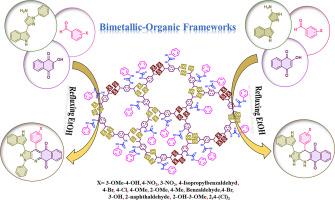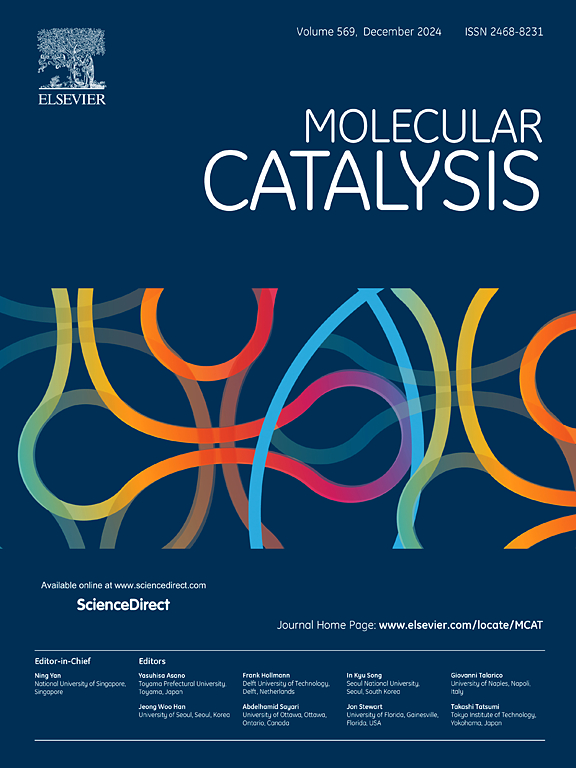Application of a new porous bimetallic H-bond catalyst in the preparation of biological henna-based pyrazolo[3,4-b]quinolines via a cooperative vinylogous anomeric based oxidation
IF 3.9
2区 化学
Q2 CHEMISTRY, PHYSICAL
引用次数: 0
Abstract
Bimetallic organic frameworks (bimetallic-MOFs) are considered promising catalysts due to their tunable pores, strength, and high catalytic performance. Here, a bimetallic-MOF-based on iron (Fe) and cobalt (Co) metals was designed, synthesized and characterized. Next, the synthesized bimetallic-MOFs were post-modified with phenyl isocyanate to create urea moieties that are susceptible to hydrogen bonding (H-bond) catalytic activities. Various techniques such as SEM, XRD, BET/BJH, FT-IR, TGA/DTA, EDX and elemental-mapping were used to approve the structure of the synthesized catalyst. MIL-88B(Fe2/Co)-UR acts as an H-bond catalyst in the multi-component reaction to form pyrazolo[3,4-b]quinolines via appropriate sections with medicinal properties. The features of using MIL-88B(Fe2/Co)-UR as an H-bond catalyst are increased efficiency, decreased reaction time and reusability of the catalyst.

新型多孔双金属 H 键催化剂在通过乙烯基异构体协同氧化法制备生物指甲花基吡唑并[3,4-b]喹啉中的应用
双金属有机框架(bimetallic-MOFs)因其可调的孔隙、强度和高催化性能而被认为是很有前途的催化剂。本文设计、合成并表征了一种基于铁(Fe)和钴(Co)金属的双金属-MOF。然后,用异氰酸苯酯对合成的双金属-MOF 进行后修饰,以生成易产生氢键催化活性的脲分子。为确定合成催化剂的结构,使用了各种技术,如 SEM、XRD、BET/BJH、FT-IR、TGA/DTA、EDX 和元素图谱。在多组分反应中,MIL-88B(Fe2/Co)-UR 可作为 H 键催化剂,通过具有药用特性的适当部分生成吡唑并[3,4-b]喹啉类化合物。使用 MIL-88B(Fe2/Co)-UR 作为 H 键催化剂的特点是效率高、反应时间短和催化剂可重复使用。
本文章由计算机程序翻译,如有差异,请以英文原文为准。
求助全文
约1分钟内获得全文
求助全文
来源期刊

Molecular Catalysis
Chemical Engineering-Process Chemistry and Technology
CiteScore
6.90
自引率
10.90%
发文量
700
审稿时长
40 days
期刊介绍:
Molecular Catalysis publishes full papers that are original, rigorous, and scholarly contributions examining the molecular and atomic aspects of catalytic activation and reaction mechanisms. The fields covered are:
Heterogeneous catalysis including immobilized molecular catalysts
Homogeneous catalysis including organocatalysis, organometallic catalysis and biocatalysis
Photo- and electrochemistry
Theoretical aspects of catalysis analyzed by computational methods
 求助内容:
求助内容: 应助结果提醒方式:
应助结果提醒方式:


